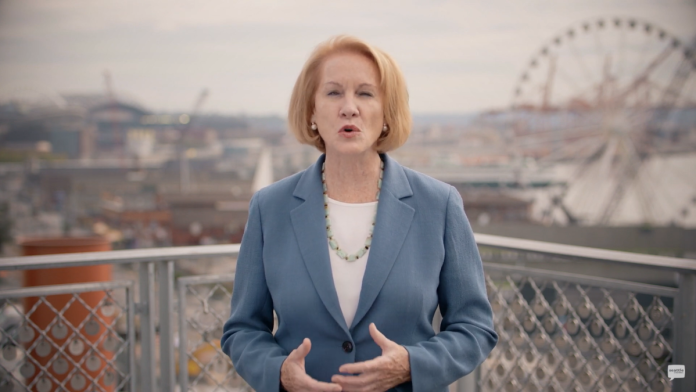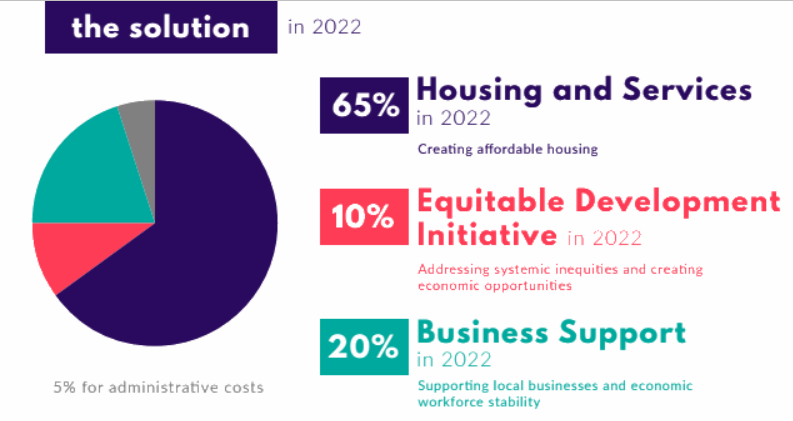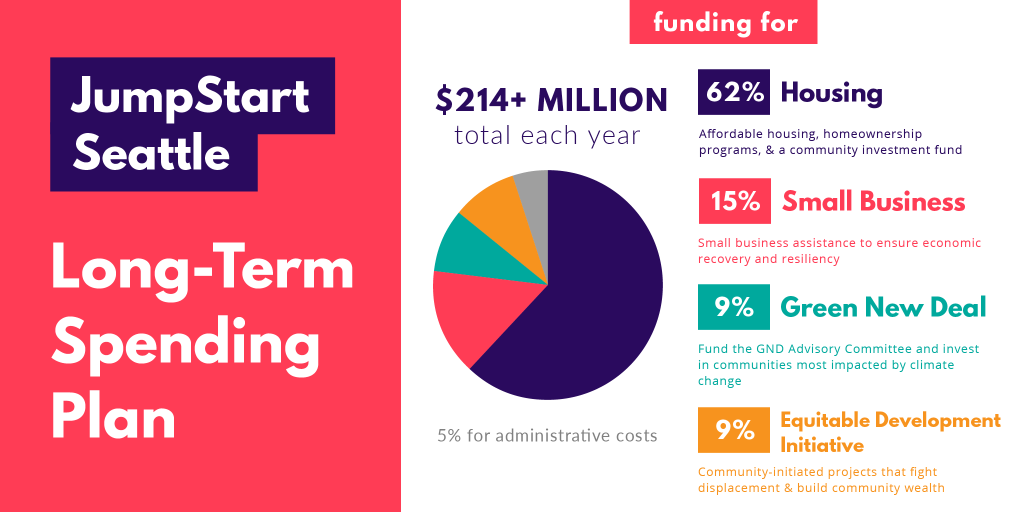
Mayor Jenny Durkan launched her next skirmish with Seattle City Council today as she released a 2021 budget that skimmed revenue from the their JumpStart Seattle spending plan to fund her marquee $100 million pledge of communities of color.
That mayoral pledge was made in June as Black Lives Matter protests ramped up. Originally pledged just to Black communities, the Mayor has now clarified the $100 million is for Black, Indigenous, and Communities of Color (BIPOC).
The King County Equity Now Coalition criticized this goalpost moving, saying money should be set aside for Black communities specifically and pointing to research suggesting all communities benefit from investing in Black people. K. Wyking Garrett, who is president of the Africatown Community Land Trust and a member of the coalition, argued the case in an interview with Omari Salisbury of Converge Media.
“Let’s get back to what was said on June 7th: $100 million for Black communities,” Garrett said.
Mayor handpicking members of Equitable Communities committee
Other disagreements Durkan has with the Equity Now and Decriminalize Seattle coalition revolve around how much to decrease police funding and how to distribute investments to the community. King County Equity Now also have its own community outreach process in motion, which the Mayor’s is circumventing and ignoring with her Equitable Communities committee process.
In a letter signed by King County Equity Now and a broad coalition of groups including climate, housing, and transportation organizations–The Urbansit included–argued against the Durkan administration’s plan to personally select all the members of the committee to guide investment decisions with the $100 million.
“We oppose a Mayor-driven taskforce with hand-picked, appointed members, as it does not reflect a community-designed and driven democratic process,” the letter states.
Re-purposing JumpStart Seattle funds was also a non-starter for letter signatories.
“The $100 million investment should not come from Jumpstart Seattle corporate tax revenue that is already allocated for other vital needs, including affordable housing, equitable development, Green New Deal investments, rental assistance, small business assistance, immigrant and refugee communities, and preserving city services and jobs from recession-driven cuts,” the letter said.

The Mayor has said she would announce the makeup of her hand-picked “Equitable Communities” committee soon. She hoped to have a recommendation by the spring and submit a supplemental budget at that time and pass it through City Council.
The Mayor said the $100 million is set aside in her budget for her pledge to BIPOC communities. However, she herself had criticized and refused to sign the payroll tax (letting it become law without her signature) due to her concerns about chasing businesses out of Seattle, facing a legal challenge, and generally not meeting revenue projections. Durkan must to confident enough in the tax to rely on it for budget, but it’s hard to assess if the $100 million is really there or viable since Durkan’s ask if for the City Council to cancel their own plans to fund hers. The City projects the payroll tax will pull in $214 million next year.
The Mayor said she prefers to use an income tax and a countywide payroll tax to fund her priorities, but when I asked during the press briefing if she would be initiating a city income tax legislation now, she said she’d prefer to get state legislation to ensure a City income tax is legal rather than face another challenge. John Burbank of the Economic Opportunity Institute said that Seattle already has the authority to pass a 1% city income tax and raise about $400 million annually.

Budget Committee Chair Teresa Mosqueda, who authored and shepherded the JumpStart plan through Council, signaled her opposition as Erica Barnett broke the news in Publicola Friday (after obtaining a leaked copy of the budget) that the Mayor planned to use JumpStart revenue to meet her $100 million pledge.
Councilmember Mosqueda told PubliCola, “JumpStart funding for 2021 was supposed to lessen the austerity cuts that were expected to core government services, much of which serves BIPOC communities. We cannot take expected JumpStart revenue to make good on a promise [Durkan] couldn’t keep.”
Funding the police
Durkan sought to frame her budget as a significant cut to the Seattle Police Department (SPD), but the majority of the cuts are simply offloaded to other departments, such as moving parking enforcement to the Seattle Department of Transportation (SDOT) and spinning off the 9-1-1 emergency call center as a separate department.
Many local organizations and protesters rallied under banner of defunding the police by 50% to invest in Black communities. The Mayor has sought to partially meet the former request, without squarely addressing the latter. The Mayor’s budget reduces the amount of sworn police officers by 23–from a total of 1423 to 1400–and institutes a civilian hiring freeze. It appears those cuts would happen by attrition rather than layoffs since SPD’s attrition rate is typically higher than 23 per year anyway.
“Our struggles to build a more equitable Seattle are interconnected. Divesting from police systems and investing in Black communities goes hand in hand with climate justice work and housing justice work,” the coalition letter states. “The places in our city where inequality cuts most deeply are also the places most heavily policed. We demand a just transition from all the systems that continue to oppress Black communities and our planet, including a just transition of jobs, democratic governance and budget-making.”
The Mayor would not reveal her plans for the Navigation Team, which is intended to connect people in homeless camps to City resources, but often carrying out encampment sweeps and trashing their belongings. She said she would lay out her plan in a later presentation. Given her previous comments, it seems likely she’ll try to keep funding in and resurrect the Navigation Team.
In their rebalancing package (which pass with an override of Durkan’s veto), the Seattle City Council voted to disband the Navigation Team, removing the SPD officer positions assigned to it, and replacing the function with nonprofit service providers. The City’s partners providing homeless outreach services had complained the presence of police during their activities had hindered their ability to make inroads with the community.
Streetcar remains in limbo
The Mayor’s budget continued to keep the Center City streetcar on an indefinite pause– a move first advanced in June as part of the 2020 budget rebalancing package.
“In response to anticipated revenue shortfalls due to COVID-19, the Center City Connector project will be paused for the foreseeable future so that we can prioritize our limited capital funding in the near term on critical projects like the Northgate Pedestrian Bridge, Madison St BRT, and the Fairview Ave N Bridge,” SDOT spokesperson Ethan Bergerson said in a written statement. “We have not determined a restart until future financial impacts are understood and the state of our fiscal resources stabilized.”
Earlier this year, SDOT delayed the Madison RapidRide G’s opening until 2024. Before the streetcar’s second trip to purgatory during the Durkan administration, SDOT had targeted a 2026 opening. Now all bets are off and the streetcar may be on death’s door with Councilmembers Lisa Herbold and Alex Pedersen (who chairs the transportation committee) are itching to kill it for good.
For its part, SDOT says it’s still planning to resume the project once it can find the funding.
“The Center City Connector Streetcar continues to be an important part of the Seattle Transit Master Plan and a desired and valuable project for the Seattle Department of Transportation,” Bergerson said. “Our work in the immediate term will be focused on ensuring that the project is paused in good state, so that we can preserve our ability to build it in the future.”
The Center City streetcar is projected to greatly boost ridership and take Seattle’s streetcar system past 20,000 daily riders shortly after opening. Without the Center City streetcar project, the future of the First Hill Streetcar and South Lake Union Streetcar, which the project would link, are very much in doubt due to the financial support from Sound Transit expiring in 2023 and no dedicated funding source identified.
Doug Trumm is publisher of The Urbanist. An Urbanist writer since 2015, he dreams of pedestrian streets, bus lanes, and a mass-timber building spree to end our housing crisis. He graduated from the Evans School of Public Policy and Governance at the University of Washington in 2019. He lives in Seattle's Fremont neighborhood and loves to explore the city by foot and by bike.

